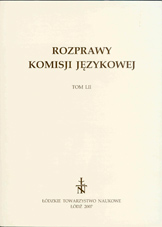O pożytku z diachronii w dydaktyce uniwersyteckiej języka francuskiego
About the benefits of diachrony in training of Romance philologists at universities
Author(s): Teresa JaroszewskaSubject(s): Language and Literature Studies
Published by: Łódzkie Towarzystwo Naukowe
Summary/Abstract: Poland’s accession to the European Union and the implementation of Bologna process in the higher education lead to questions about the shape of reformed programs and the mission of universities in the period of globalization and free market economy. The article presents the basic arguments for including diachrony in teaching of French at universities, from where it is more and more eliminated. It also provides practical examples of its application in training of Romance philologists (tab. 1–3). The history of language, utilizing the achievements of a number of disciplines, such as history, literature and linguistics, plays an important role in development, synthesis and systematization of knowledge. Historical grammar is fundamental to the understanding of French spelling because of its archaic and etymological nature (contemporary spelling to a major extent is a reflection of phonetics and etymology of the Old French). It is also helpful in logical explanation of many complexities of the contemporary phonetics and morphology, of the so-called irregular forms and exceptions, which, from the point of view of the contemporary language, seem incoherent. As far as phonetics is concerned, in comparison to other Romance languages, French departed from Latin the most. That is why knowledge of its historical transformations is favorable for fast learning of other Romance languages, and may be very useful in acquiring a passive multi-language competence so important in the uniting Europe.
Journal: Rozprawy Komisji Językowej
- Issue Year: 2007
- Issue No: 52
- Page Range: 47-57
- Page Count: 11
- Language: Polish

